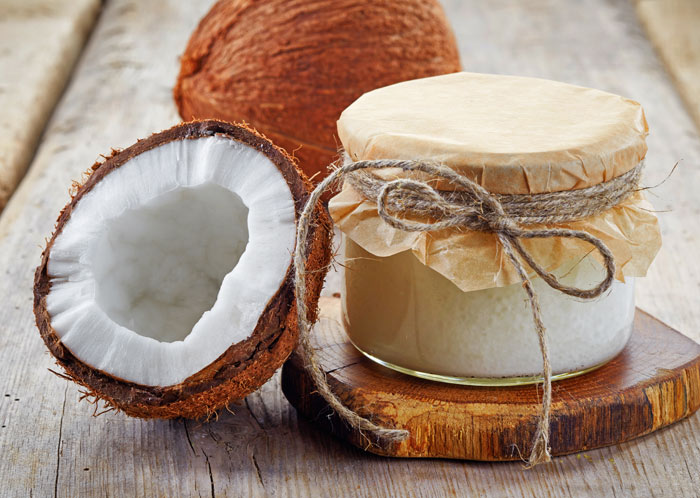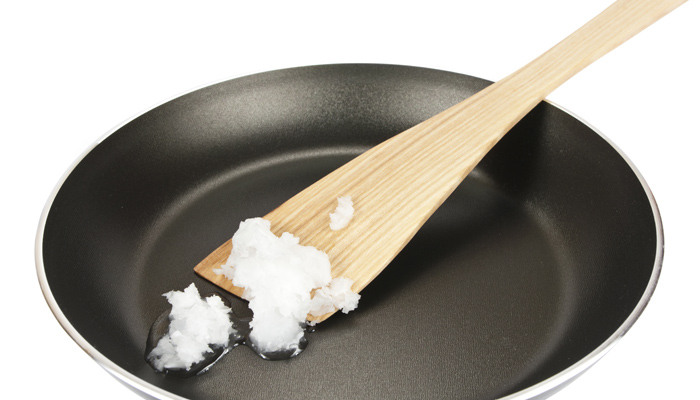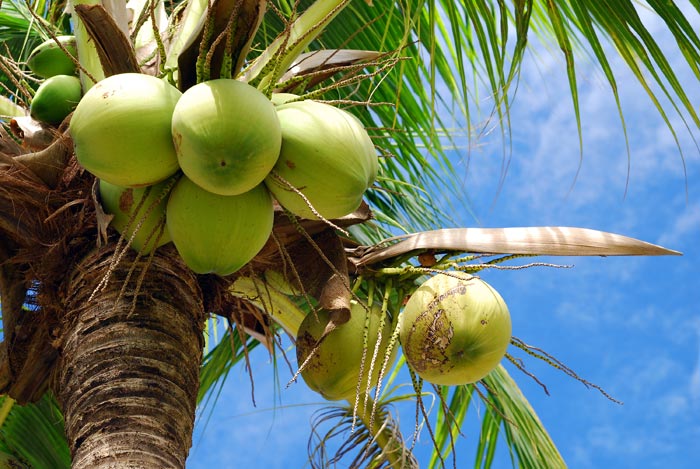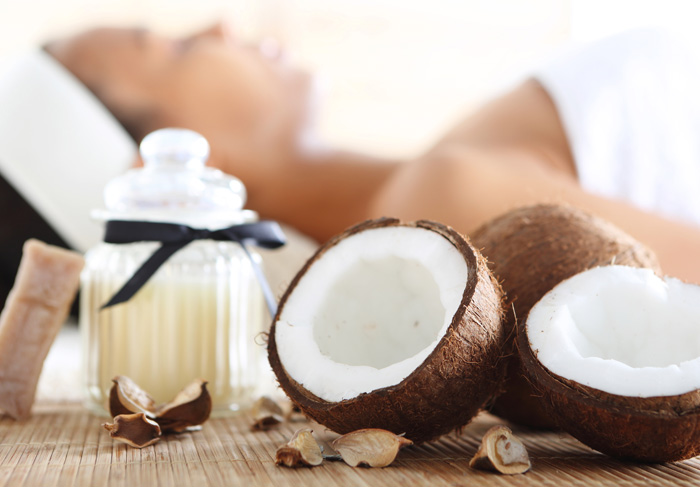Table of Contents
Most of us are aware that the natural health world is packed with different and often conflicting beliefs. Take coffee, for example. For every ten researchers who proclaim that coffee is an antioxidant-rich superdrink that can guard us from Alzheimer’s disease, you’ll find another ten who state, with equal conviction, that giving up coffee is a requisite for superior adrenal and mental health.
Raw food, red wine, sugar alcohols and fasting seem to be similarly divisive subjects. And then there’s the vegetarian vs. non-vegetarian debate…
If there’s one subject out there that almost all health researchers agree upon, however, it’s that coconut oil – an edible oil derived from the meat of matured coconuts – is good for you. I mean, really good for you. The scientific research into this subject, which is extensive and robust, is simply too convincing.
Coconut Oil: Once Demonized, Now Lionized
It wasn’t always this way. Like eggs, red meat and other foods rich in saturated fats, coconut oil’s reputation was completely demolished in the 1950s when pioneering nutritionists – most famously Ancel Keys – developed the notorious lipid hypothesis, which claimed that high-fat foods raised cholesterol and contributed to heart disease. Even when the lipid hypothesis was eventually exposed as misguided and based on cherry-picked data, it still influenced consumer choices well into the 2000s.

Once upon a time, coconut oil was viewed as a heart attack in a jar
Fortunately, even mainstream nutrition sources are starting to acknowledge that whole foods rich in natural fats, such as coconut oil, were never a problem in the first place.
Why Is Coconut Oil Good for Us?

Notice anything strange about the chart above, whose data was obtained from the USDA nutrient database? That’s right: Coconut oil contains no vitamins or minerals at all. Vitamin A, vitamin C, calcium, magnesium… you name it, it doesn’t have it. Instead, the majority of coconut oil’s health benefits stem from its large concentrations of saturated fatty acids.
According to a spectral analysis provided by Chempro, coconut oil consists of approximately:
- 44-52% Lauric acid
- 13-19% Myristic acid
- 8-11% Palmitic acid
- 6-10% Capric acid
- 5-9% Caprylic acid
- 5-8% Oleic acid
- 1-3% Stearic acid
With the exception of oleic acid, which is monounsaturated, all of these fatty acids are saturated. More significantly, three of them – lauric, capric and caprylic – are medium-chain triglycerides, which, as we’ll soon discover, are more beneficial for our bodies than the long-chain triglycerides found in regular fatty foods like cheese.

We’ll also discover that coconut oil is one of the healthiest cooking oils in existence
Research into the Health Benefits of Coconut Oil
Guards Us from Infections
The most common fat in coconut oil is lauric acid, a 12-carbon fatty acid that is rarely found in nature (only laurel oil and palm kernel oil contain lauric acid in comparable amounts). When consumed, our bodies convert lauric acid into monolaurin, a chemical that is one of the most potent antivirals, antibacterials, antimicrobials and antifungals in the natural world.
One study for the Journal of Bacteriology, for example, found that lauric acid inhibited the expression of Staphylococcus aureus, a nasty bacterium carried by an estimated 20% of the world’s population (1). This bacterium, which has become increasingly antibiotic-resistant in recent times, can cause a huge amount of damage in the human body, ranging from minor skin infections like pimples and boils to serious diseases like pneumonia and meningitis.

Staphylococcus aureus: proof that even bad things come in pink
Another study, published in the Medical Mycology Journal, listed lauric acid as one of four fatty acids that could inhibit the excessive growth of Candida albicans, a fungal pathogen in our intestinal tract that contributes to yeast infections when allowed to proliferate (2). Funnily enough, the other three fatty acids – caproic acid, caprylic acid and capric acid – are also present in coconut oil, suggesting that coconut oil is an ideal food for treating candida.
Did you know?
Approximately 20% of the total saturated fatty acids in human breast milk are lauric and capric acids, which guard the infant from viruses and other infections. This is why coconut milk (which is similar in fatty acid composition to coconut oil) can substitute mother’s milk in emergency situations.
Boosts Cardiovascular Health
50 years ago, when the lipid hypothesis’ influence was in full swing across the West, you would have been laughed at if you claimed that coconut oil could improve cardiovascular health. After all, everyone knows that high-fat foods are bad for your heart, right?
Of course, we know a lot better now. More and more studies – free from government agendas – show that coconut oil contains some amazing cardiovascular-boosting properties. Don’t take my word for it, though. Check out some of the conclusions reached by contemporary researchers:
In summary, adding more coconut oil to our diets is a great way to protect ourselves from cardiovascular disease, which remains the Western world’s number one “silent” killer. Who would have thought it?

Coconuts love your heart!
According to research published in the International Journal of Food Sciences and Nutrition, the two major antioxidants in coconut oil (i.e., the ones with the most potent free radical scavenging abilities) are ferulic acid and p-coumaric acid (7). Future research might eventually show that these two components are responsible for coconut oil’s main cardiovascular benefits.
Did you know?
The American dentist and nutrition researcher, Weston Price (1870-1948), traveled to exotic countries in the 1930s to study the diets and health of their native populations. Price discovered that populations that consumed huge amounts of saturated fat – often in the form of coconuts – enjoyed exceptionally good health and suffered from no cardiovascular diseases at all!
Possible Treatment for Alzheimer’s Disease
According to Dr. Mary Newport, author of the 2011 book Alzheimer’s Disease: What If There Was a Cure, the ketone bodies in coconut oil’s medium-chain triglycerides (MCTs) function as an alternative fuel source to glucose (our brain’s main fuel supply). Since a decrease in the ability to use glucose is a common cause of neurodegeneration, coconut oil could help shield us from Alzheimer’s disease and other causes of dementia.
Newport explains this theory on her website, CoconutKetones.com:
She continues:

Approximately 60% of our brain consists of fat. When we deprive our brain of dietary fat, it begins to degenerate… and dementia can result
While Newport’s research is theoretical, studies suggest that she might be on to something. One study published in the journal Neurobiology of Aging, for instance, found that mentally impaired people that consumed emulsified medium-chain triglycerides experienced a significant improvement in cognitive function, such as paragraph recall, when compared to the control group (8).
Reduces Appetite and Accelerates Weight Loss
Due to their reduced chain length, medium-chain triglycerides can be absorbed much more quickly than the long-chain triglycerides (LCTs) found in most other high-fat foods. This rapid metabolic conversion means that MCTs are burned as fuel almost immediately rather than stored as fat, making them attractive to athletes and weight lifters.
However, MCTs also have other benefits that might appeal to regular, non-athletic people. A 2014 study for the European Journal of Clinical Nutrition found that overweight men who consumed 20g of MCT oil for breakfast experienced reduced food intake when compared to the group that consumed LTC-rich corn oil (9).
Another study, featured in the journal Lipids in 2009, found that women who supplemented their diets with 30 milliliters of coconut oil over a 12-week period experienced a reduction in waist circumference (i.e., abdominal fat) and BMI when compared to the group that took LTC-rich soybean oil (10).

Belly fat: the most stubborn fat of all
So, does this mean that coconut oil can reduce the belly fat that has plagued us for years? Probably not – at least if we continue to eat unhealthy foods and lead sedentary lifestyles. That said, the MCTs in coconut oil are an extremely efficient source of fuel for our bodies (much more so than carbs) and, if combined with improved diet and increased exercise, can potentially accelerate fat burning.
What Is the Healthiest Coconut Oil?
The best kind of coconut oil to consume is coconut oil that is organic and unrefined. Unrefined coconut oil (often advertised as “virgin” or “extra virgin”) has not been bleached or deodorized, resulting in a product that maintains a strong fatty acid profile and actually smells of coconuts.

Non-organic coconuts are actually safe to consume, since their thick shells protect the flesh from the pesticide… but I still don’t recommend supporting such an industry
As a general rule, coconut oil sold in Western supermarkets is likely to be refined and non-organic (some brands might even be hydrogenated or partially hydrogenated, and thus contain harmful trans fats). Coconut oil sold in health food stores, on the other hand, tends to be unrefined and organic. That’s the kind you want.
Cooking with Coconut Oil
Due to its pleasant taste and high smoke point of 350°F (meaning it remains stable at high heat), coconut oil is an ideal oil for cooking. Moreover, since coconut oil is arguably the world’s healthiest oil, there is no downside to replacing your regular cooking oils with it.
Here are a few ideas to get you started:

… And let’s not forget the old favorite: coconut oil in coffee
Did you know?
Coconut oil has a high melting point of 75°F (25°C). This means that it will usually be solid at room temperature (unless you live in a hot climate), and will always become solid when poured down the drain or sink. Therefore, unless you want to block your plumbing, always discard excess coconut oil in the bin!
Also, I recommend storing your coconut oil in a cupboard rather than the fridge. Refrigerated coconut oil becomes as solid as a rock and will be difficult to scoop out!
Cosmetic Uses for Coconut Oil
While consuming coconut oil is the best way to reap its health benefits, we shouldn’t overlook its many non-dietary uses. After all, the same fatty acids and antioxidants that make coconut oil such a healthy food also make it a fantastic cosmetic aid.

Coconut oil’s uses are not limited to diet







